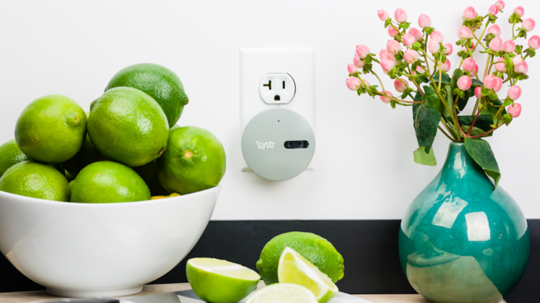
Businesses in nearly every industry---from fashion, to take out, to pharmaceuticals---are worried about Amazon eating their lunch. In fact, this summer Reuters found that 10% of all the earnings calls this year in the U.S. mentioned Amazon by name.
With everyone wondering how Amazon's rapid growth and ambitious plans will impact their company, it might seem crazy for a startup to jump directly into a space where Amazon operates, with a hardware device that's not unlike Alexa.
But that's exactly what Chicago startup Lystr is doing, and it thinks it can win with its simple hardware device that has one big advantage over the Amazon Echo.
Lystr is a smart Internet-of-Things kitchen device that solves one major pain point: grocery shopping. The Wi-Fi enabled device plugs into an outlet in your kitchen and lets you scan the barcode of items that need to be purchased at the store.
Scanning an item automatically adds it to the Lystr app, which you use as your grocery list while shopping at the store. Lystr also has voice recognition for items that don't have bar codes, allowing you to say things like, "Hey Lystr, add bananas to my shopping list."
Lists can be shared within households, meaning that whoever does the family shopping can see everything that's been scanned, regardless of who added it to the list.
Lystr was founded in 2015 by Kara Scanlin while she was getting her MBA at the University of Chicago Booth School of Business. She's been building the product at mHub, Chicago's co-working hub for hardware makers, and officially launched the product today on Kickstarter. The product sells on the crowdfunding site for $99, and will eventually retail for $119.
The idea is to create a process where adding items to a grocery list is as effortless as possible, Scanlin said. A quick scan of the pasta sauce can before it's recycled, or telling Lystr to add olive oil while you're doing the dishes, helps users build a shopping list without having to open an app or write things down with pen and paper.
"People aren’t interested in stopping what they’re doing to go into an app," Scanlin said.
This brings us back to Amazon. Echo and Echo Dot users can currently ask Alexa to add items to their shopping list, which lives in the Alexa app. The problem, Scanlin, said, is that Amazon creates a general shopping list that doesn't include as much detail as Lystr. Sure, Amazon can add ranch dressing to your list. But Lystr's bar code scanner can tell you the brand and size of the item as well. Another advantage is that Lystr is retailer-agnostic, Scanlin said, which allows people to scan and shop from whatever store they want.
"People aren't going to buy everything from Amazon," she sad.
Ultimately, it's Lystr's ease of use that Scanlin thinks will help it be a staple in the home. It's already in the kitchen (most Amazon Echos are likely in the living room), and it's ready to easily capture grocery items when you're thinking about them the most.
"It's exciting to me to be working on something physical and real ... Something that makes a sound when it hits the ground."
Scanlin is part of a small, but growing, group of hardware founders in Chicago. Chicago's tech scene is dominated by B2B software, and the number of entrepreneurs tackling devices is small (and the women-led hardware startups is even smaller). Scanlin said she felt compelled to tackle a problem many households face.
"Hardware is hard, but I wouldn’t have it any other way," she said. "It's exciting to me to be working on something physical and real ... Something that makes a sound when it hits the ground."








